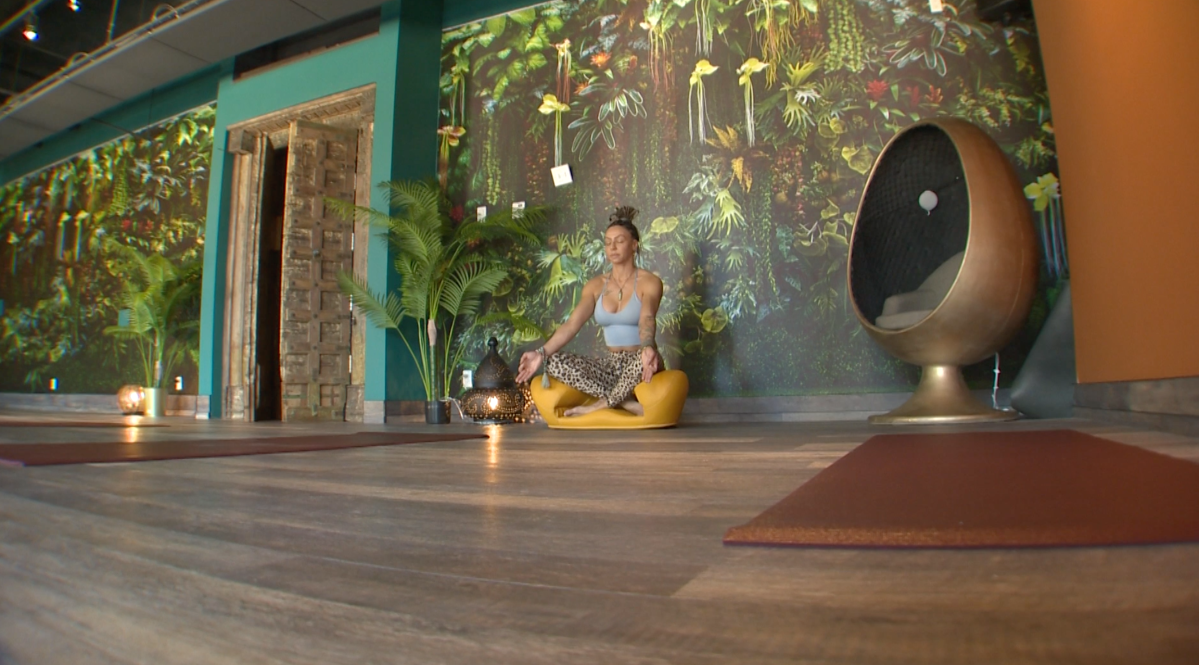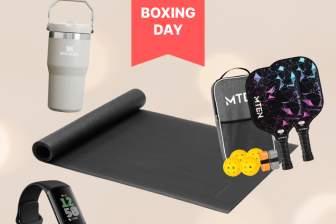Lisa Balestri is a 60-year-old financial consultant in Toronto who is pushing back against the novel coronavirus pandemic.

She is respecting physical distancing protocols but she continues to go for daily walks and runs. She also spends two hours strength-training every other day.
It’s impressive for anyone at any age, considering gyms and fitness studios have yet to reopen across the country.
Three months ago, the fitness industry was booming, generating an estimated $127.4 billion worldwide according to The International Health, Racquet & Sportsclub Association. There was something for everybody: spinning, barre, pilates, CrossFit, yoga, dance, you name it.
Today, the health and wellness industry remains in flux with most gyms across Canada still closed due to COVID-19.
According to a recent IPSOS poll that surveyed 16 countries, 30 per cent of Canadians are feeling anxiety about the pandemic, with 29 per cent saying they’re overeating. The same percentage also reported a lack of exercise.
READ MORE: The gym will be one of the toughest spaces to reopen, experts say
“There’s longstanding research to show that there’s a relationship between physical activity and mental health. Being active improves mood, (relieves) symptoms of depression, symptoms of anxiety in a number of ways. We can’t really fight the research anymore on that,” said Catherine Sabiston, a professor at the University of Toronto and research chair in physical activity and mental health.
Balestri acknowledges that staying active is essential in her physical and mental health. She is living with a herniated disc, arthritis, and spinal stenosis, which can trigger excruciating pain in her neck.
Finding fitness equipment
Sitting still and being sedentary is not an option for her.
“I find that if I don’t excercise, the pain will start again. When you’re in pain, I think it’s such a mental toll on you. It can put you into a depression, high anxiety,” says Balestri.
She takes advantage of the outdoors and has a simple set-up at home including a fold up bike, a yoga mat, light weights, and dumbbells that her father once used back in the 1950s.
As modest as it is, not everyone has access to fitness equipment like Balestri.
Days after lockdown, free weights and fitness-related equipment became as hard to find as toilet paper. Unfortunately, the former is still difficult to find.
“The last month or two, the supplies have been very low because our suppliers have run out of inventory. But it seems like they’re catching up and we’ll finally be able to fulfill hundreds of orders,” says Michael Gatbonton, manager at Spartan Fitness, which sells exercise equipment in Ontario and the Maritimes.

“A lot of weights, barbells are made overseas and it takes them a while to get here.”

Get daily National news
Turns out the supply chain for fitness equipment had the same vulnerabilities as personal protective equipment. Most of it is made overseas, making them hard to get during a worldwide pandemic, he said.
But necessity is the mother of invention and many Canadians have adapted by participating in online home workouts.
Caleigh Rykiss is the owner of BOLO in Toronto, a 7,000 sq-foot fitness facility that once held around 16 classes, serving several hundred clients on a daily basis. She quickly pivoted her business; renting out weights and hosting digital workouts.
“Of course, it’s different to teach people online than it is in-person. However, I think we need to take a moment to reflect on how privileged and lucky we are to be in a time where we can still connect face-to-face. Another benefit of the virtual world is that we can serve more people from more places farther away,” she said.
It’s not just an opportunity to burn calories, it’s an opportunity to connect emotionally with the community, she adds.
Innovating and adapting
Select gyms reopened across Canada early June like Club 16 Trevor Linden Fitness in B.C. with new protocols, increased sanitation and reduced capacity. Meanwhile, gyms in Toronto remain closed, although an upcoming yoga event is proceeding as planned that will allow participants to step out of their at-home bubble into another one.
Even though gyms are innovating and adapting, the fitness industry won’t be the same for a long time.
“We know one of the main barriers to people exercising is the fear of going into the gym in the first place…Even those who didn’t experience that anxiety going into the gym may now experience it. For some individuals, it will be very anxiety-provoking,” says Sabiston.
Addressing physical and mental health is something that will have to tackle once doors re-open. And in some cases, doors that never opened in the first place.
TRIBESpace Yoga owner Jordana Ricketts was supposed to open her Toronto studio in the spring but the pandemic put a pause on the poses.
“Every day I’m just putting one foot in front of the other to continue on this path as though we will be successful, as though COVID will not bankrupt us,” she said.
She believes that there is a place for her space post-pandemic, especially for those who will need a physical and mental reset after months of isolation.
“When you appeal to their sights, the sounds with the music, and the smells with the incense and the sage that we have burning here all the time…all of those factors combined are really gonna draw people here and feel that feeling of relaxation,” Ricketts adds.
Balestri finds that calm and relaxation when she works out. It’s not just a physical necessity, it’s also a way for her to stay connected to her late father.

“These are special weights. They are my dad’s weights,” says Balestri, as she points to the rusted screws keeping it in place.
She says her dad had a lot of physical challenges later in his life, but that he kept moving. He kept walking.
Balestri doesn’t rule out going back to a gym in the future.
But for now, she’s just happy to be active and blazing her own trail.
Questions about COVID-19? Here are some things you need to know:
Symptoms can include fever, cough and difficulty breathing — very similar to a cold or flu. Some people can develop a more severe illness. People most at risk of this include older adults and people with severe chronic medical conditions like heart, lung or kidney disease. If you develop symptoms, contact public health authorities.
To prevent the virus from spreading, experts recommend frequent handwashing and coughing into your sleeve. They also recommend minimizing contact with others, staying home as much as possible and maintaining a distance of two metres from other people if you go out. In situations where you can’t keep a safe distance from others, public health officials recommend the use of a non-medical face mask or covering to prevent spreading the respiratory droplets that can carry the virus.
For full COVID-19 coverage from Global News, click here.













Comments